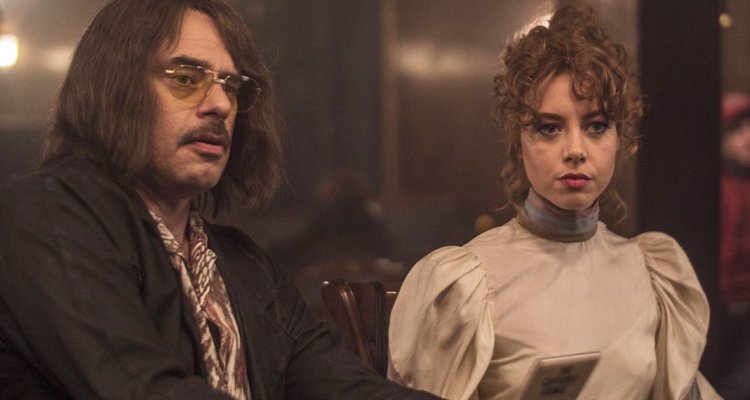Writer-director Jim Hosking doesn’t think like a regular filmmaker, or, at least, in the narratively conventional sense. What is most important to Hosking, who first gained attention for his film “The Greasy Strangler,” is to create a world only he can conceive. His films are filled with the kind of unique characters that you have never seen before in cinema. And because of this, the filmmaker has his fair share of detractors, but the fact that Hosking has managed to find a way to break out of the mold with such a unique brand of filmmaking is something to celebrate. In essence, nobody makes movies quite like Jim Hosking.
What Hosking’s eccentric style has now produced is “An Evening with Beverly Luff Linn,” the story of an unhappy coffee shop worker, Lulu Danger (Aubrey Plaza), recently fired by her husband (Emile Hirsch) who convinces a stranger (Jemaine Clement) to go on a road trip with her. Lulu’s goal is to confront a mysterious man from her past, Beverly Luff Linn (Craig Robinson). However, Beverly doesn’t speak, mostly grunting and moaning his way in life, and has his manager, Rodney Von Donkensteiger (Matt Berry) doing the crux of the talking for him.
It’s a mysterious, deadpan comedy that has surprisingly romantic touches, as well. Although you shouldn’t expect the shocking nature of ‘Greasy Strangler,’ Hosking continues to further evolve as an artist by not adhering to any kind of norms or catering to mainstream audiences. Make no mistake, his films are for a particular crowd and that’s what makes the filmmaker’s work so refreshing to behold. Hosking’s films don’t abide by any rules whatsoever.
I spoke to Hosking about ‘Beverly Luff Linn,’ how he concocts his weird style and why Marvel films just aren’t for him.
It seems like in your movies the characters have to be unique and strange. Is your goal to go for characters we have not seen before?
I am definitely trying to present something different to an audience. I feel like I want the characters to be individuals and distinctive but I think that there are some characters in the film who are more sympathetic than others and who may relate to maybe more than others. But I’m trying to create a slightly different world with a different kind of universe for people to be transported to. I mean I am not making a Ken Loach film. [laughs]
Is there anything you want an audience to take from your characters?
I cannot anticipate how people will react. I mean any film that you watch will be a different film to any other person that watches it. When I am making this film, I am trying to create something that I would be excited to see myself. I am trying to make a film that will connect emotionally with me but will also make me laugh. I was trying to combine tones that maybe do not go together, which can make for an eccentric peculiar world of comedy with a sort of romantic side to it also. I suppose I want to affect people the way I was affected when I made the film. I have no control over how people will react, but I was trying to make a film with a surprising emotional sensitivity to it. That was the major difference with this film and maybe “The Greasy Strangler.”
With that film, as well as ‘Beverly,’ you are not concerned with what is going on outside the world today. Would it ever interest you at all to make a movie like that?
I think that even though it’s a different world that I tackle [in ‘Beverly Luff Linn’], I still feel it’s, in a funny way, about a woman taking control of her life. It’s very diverse, it’s liberating, unconventional in that way. I feel like it does try to empower the viewer a bit, but not in a didactic political theorizing way. To me, it is a cathartic expression and that can still have an effect on people but maybe not in a literal fashion. A staunch Republican, a sort of rampant Trump supporter, would not make this movie.

